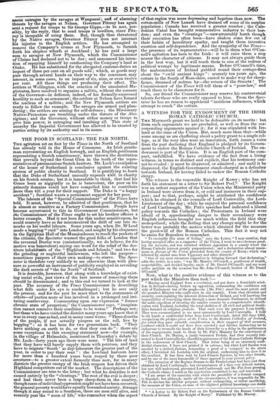THE POOR IN SCOTLAND: THE FAR NORTH.
THE agitation set on foot by the Times in the North of Scotland has already told in the House of Commons. An Irish gentle-
man representing an English borough, and an English gentleman representing a Scotch constituency, have thrown the destitution that prevails beyond the Great Glen in the teeth of the repre- sentatives of parsimonious Scotch heritors. Mr. Loch's exculpation of the house of Sutherland is conclusive against the existing system of public charity in Scotland. It is gratifying to learn that the Duke of Sutherland annually expends 450/. in charity on his Scotch estates ; but it is lamentable to think, that had his Grace been as niggardly as he is benevolent, the poor on his princely domains could not have compelled him to contribute more than 42/. a year for their support. The Duke is "a happy accident"; Scotland wants a permanent support for her poor. The labours of the "Special Commissioner" of the Times have told. It must, however, be admitted of that gentleman, that he
is almost as sensitive as a Factory Commissioner. People have become accustonied to this in Government Commissioners, but the Commissioner of the Times ought to set his brother officers a better example. Had it not been for this undue sensitiveness, he could scarcely have so far misconceived the drift of our late re- marks on his useful labours. Some years ago, when Dr. M‘Leod made a begging " raid" into London, and sought by his eloquence in the Egyptian Hall of the Mansionhouse to reach the pockets of the citizens, the Spectator warned the good folks of London that the reverend Doctor was (unintentionally, we do believe, for his motive was benevolent) saying one Word for the relief of the des- titute inhabitants of the "highlands and Islands," and two for the grinding or neglectful landowners, who left the paupers— sometimes paupers of their own making—to starve. The Spec- tator is therefore very unlikely to see otherwise than with plea- sure so powerful an instrument of publicity employed in revealing the dark secrets of "the far North" of Scotland.
It is desirable, however, that along with a knowledge of exist- ing social evils, just views of the best means of removing them should be disseminated ; and to this end we turned to look at the past. The accuracy of the Times Commissioner in describing what falls under his eye is unchallenged ; but he sees only the present, and for the past he must trust to the statements of others—of parties more or less involved in a prolonged and irri- tating controversy. Commenting upon our expression "former chronic state of pauperism," the Commissioner says, "imagina- tion cannot conceive their condition to be worse." Perhaps not; but those who have visited the district many years ago know that it was in every case as bad, and in many cases worse. "Three-fourths of the people, if not actually paupers on the roll, live by begging " : so it has been for two generations back. "They have nothing on earth to do, or that they can do " : there are some exceptions to this sweeping statement now—for example, in the village of Helmsdale, mentioned in Thursday's debate by Mr. Loch—forty years ago there were none. "The bits of land that they have will barely supply them with potatoes, and they have to migrate 'South' as day-labourers the greater part of the year, in order to pay their rent " : the Lowland harvests have for more than a hundred years been reaped by those poor creatures—to a greater extent formerly than now, for in many districts the greater energy of the Irish reapers has driven their Highland competitors out of the market. The descriptions of the Commissioner are true to the letter ; but what he describes is not caused entirely by the i " dearin.,0-s." The root of the evil deeper ; and had there never been a large sheep-farm in the country, though cases of individual oppression might not have been occurred, the general poverty wouldhave equally benumbed society. Strange though it may sound to a Southron, there are men still alive, and scarcely past the "noon of life," who remember when the aspect
of that region was more depressing and hopeless than now. The cotton-mills of New Lanark have drained off some of its surplus population ; Canada has received a greater number ; the Cale- donian Canal has brought remunerative industry to their bor. ders ; and even the "clearings "—unwarrantably harsh though their execution has often been—have shaken some few out of their habits of hereditary apathy, and taught them inventive exertion and self-dependence. And the sympathy of the Times— the presence of its representative—will be to them what O'Con- nell's agitation has been to the Irish : it will raise them a step nearer the character of citizens. It may not always guide them in the best way, but it will teach them to aim at the redress of political wrongs by legitimate means. Before O'Connell's time, the malecontents of Ireland gabbled round their cottage-fires about the " owld ancient kings " : scarcely ten years ago, the cotters in the South of Ross-shire, ousted to make way for sheep- farms, dreamed of redress by—the return of the Stuarts! The Commissioner of the Times will tell them of a "poor-law," and teach them to be clamorous for it.
So, our friend the Commissioner may reserve his controversial talents for those who are really opposed to him. From the Spec- tator he has no reason to apprehend "insidious influences, which attempt to crush" the cottars.


























 Previous page
Previous page